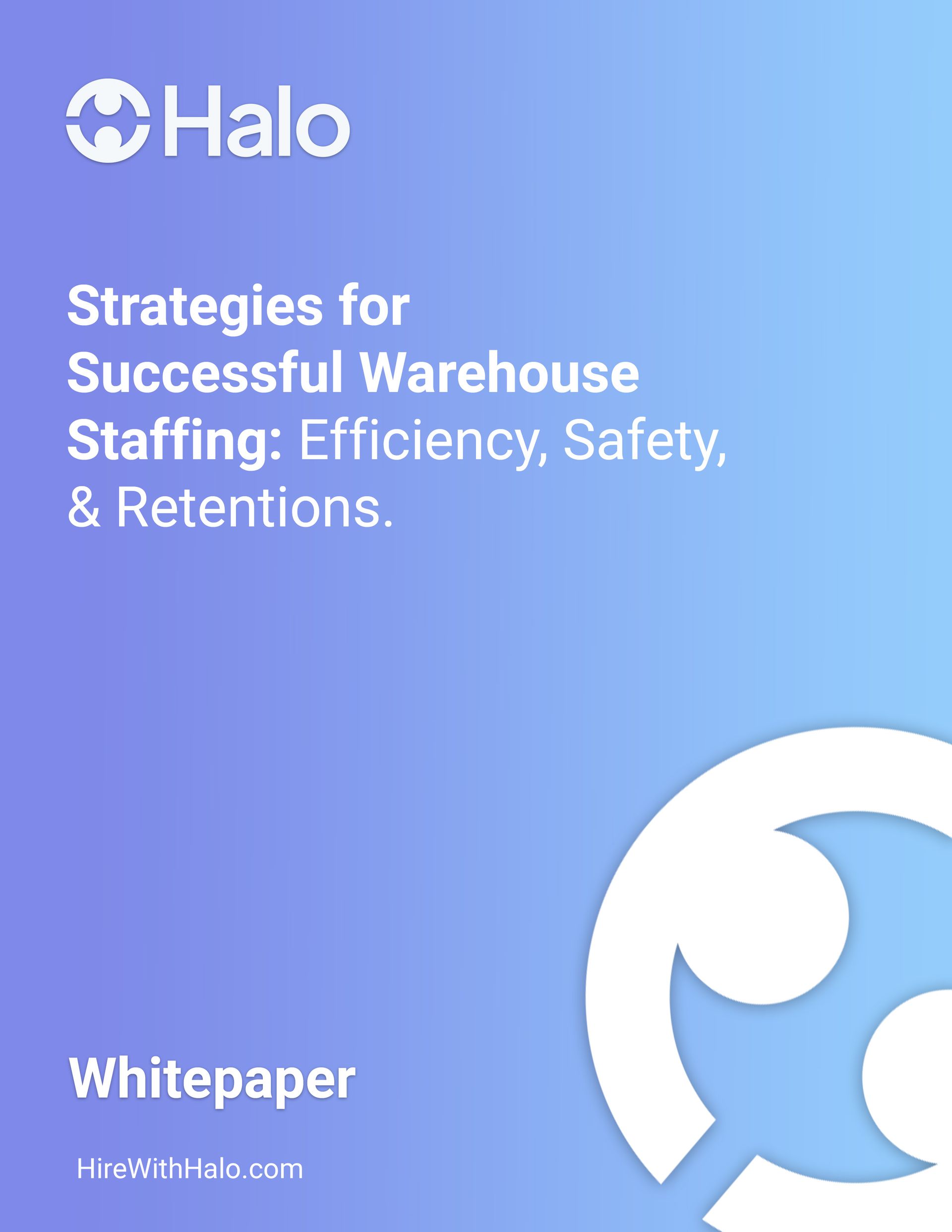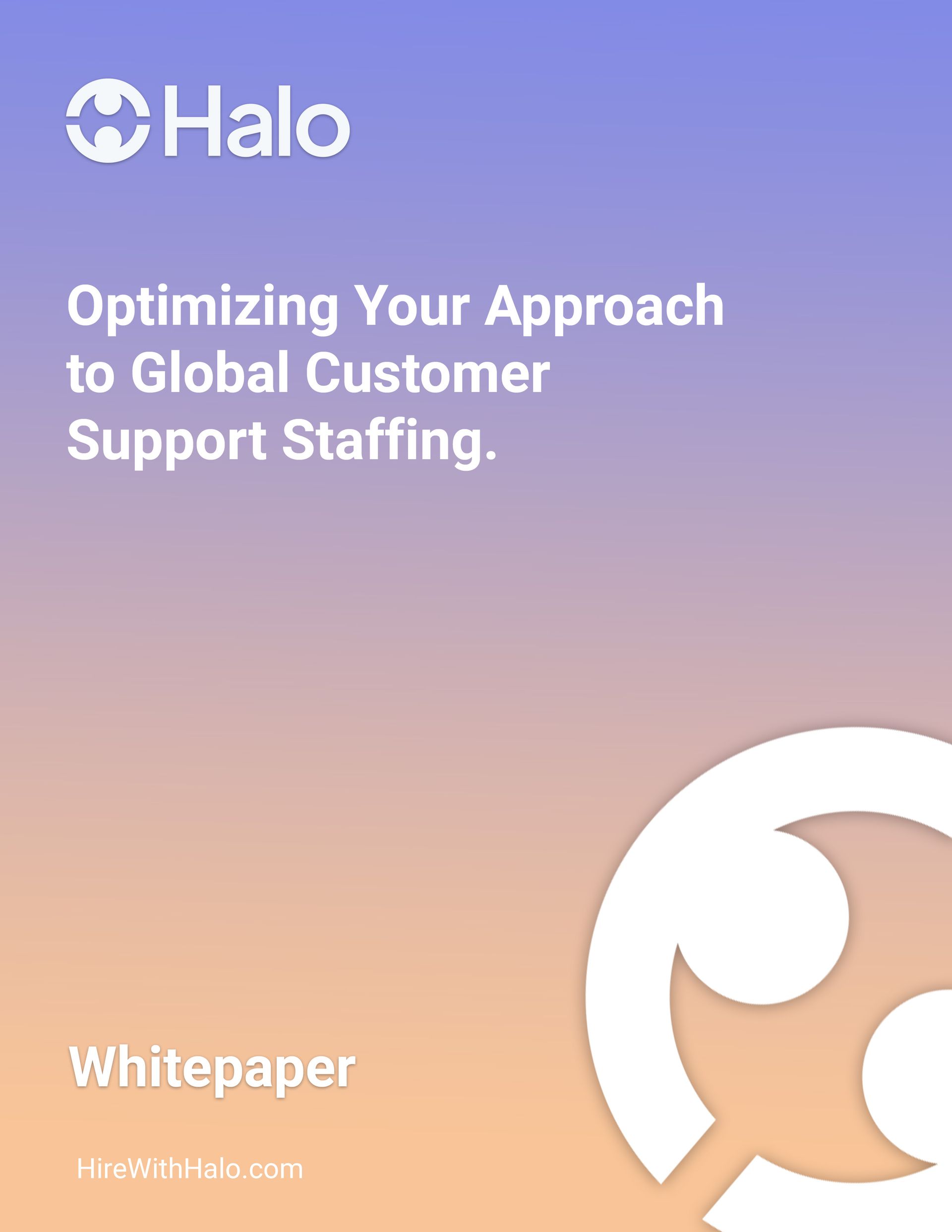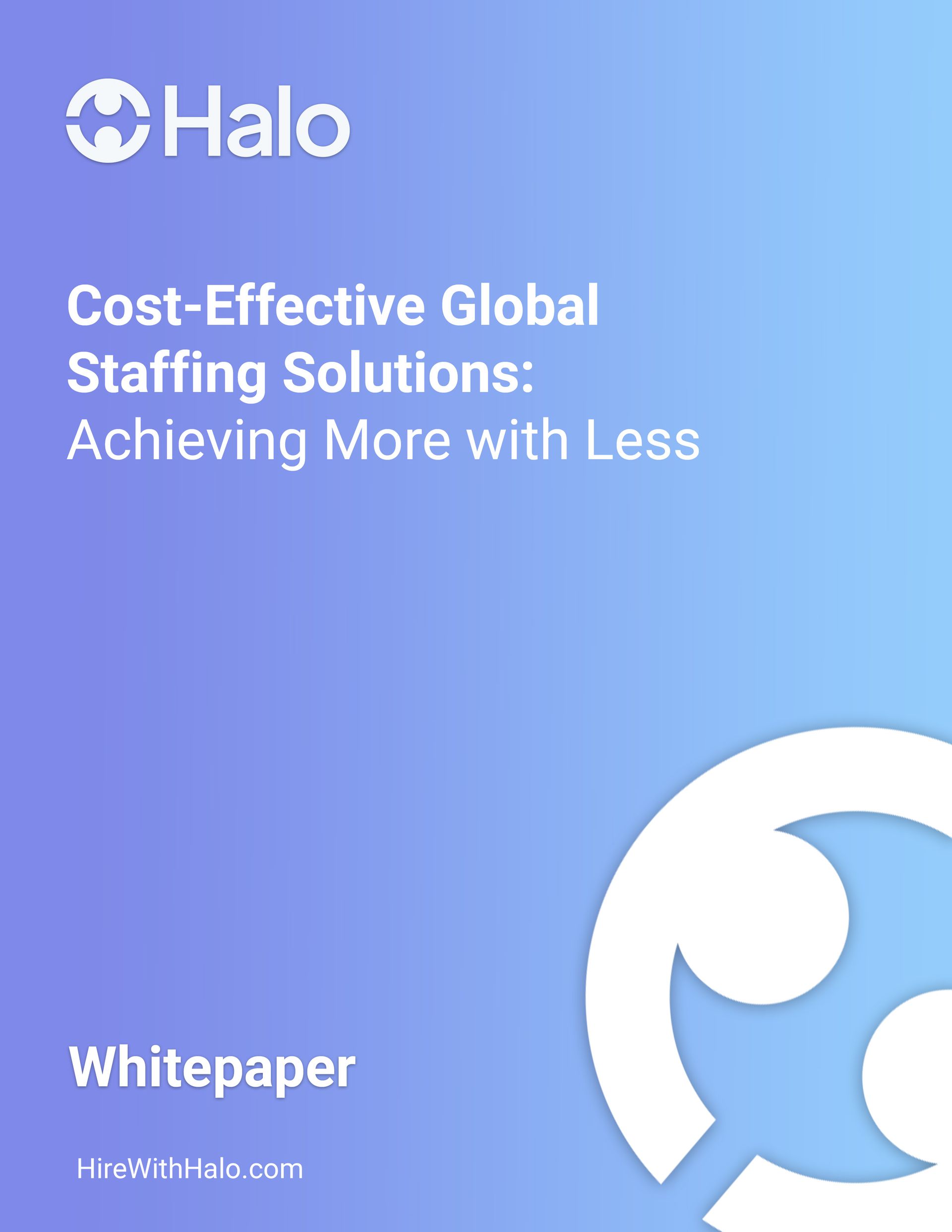
The Future of Work: Navigating Global Talent in a Post-Pandemic World
Introduction
In March 2020, the world was gripped by an unprecedented global health crisis. The COVID-19 pandemic not only challenged our daily lives but also the very fabric of our global workforce. Businesses, large and small, faced a stark reality: adapt or falter. This adaptation wasn't merely about surviving the pandemic but about reimagining the future of work.
At Hire with Halo, we witnessed firsthand the seismic shifts iworkplace norms. Traditional office environments and 9-to-5 schedules quickly gave way to living rooms and flexible work hours. As a staffing and recruiting agency with a global perspective, our mission became more critical than ever: to make global staffing simple, affordable, and fast. We committed ourselves to help businesses navigate these changes, leveraging our expertise to connect them with high-quality staff from around the world, regardless of the physical distance.
Our approach was not just about filling positions but about understanding the evolving needs of the global workforce. We embraced the challenge, adapting our strategies to meet the demand for flexibility, digital transformation, and a deeper connection with a worldwide talent pool. In doing so, we not only helped our partners adapt but also thrive in this new landscape.
The Evolution of the Workplace
The pandemic accelerated several workforce trends that were already underway, most notably remote work, digital collaboration, and the formation of global team structures. Pre-pandemic, these were considered forward-thinking work practices. However, they quickly became necessities for continuity and resilience.
Remote Work: Once a perk offered by a minority of companies, remote work became a staple across industries. Businesses that had never considered remote operations were suddenly managing entire teams virtually. This shift demonstrated that many jobs could be performed effectively outside traditional office settings, challenging long-held beliefs about productivity and team dynamics.
Digital Collaboration: The move to remote work necessitated the adoption of digital collaboration tools. Video conferencing, cloud-based project management software, and real-time communication platforms became vital. Companies that quickly embraced these tools were able to minimize disruptions and maintain, or even increase, productivity.
Global Team Structures:
With the realization that work can be done from anywhere, companies began looking beyond their local talent pools. This expansion was not only about filling roles but also about embracing diversity and the innovation that comes from global perspectives. Teams became more culturally and geographically diverse, bringing together a rich mix of ideas and approaches.
Real-World Examples:
- Tech Giants Lead the Way: Companies like Twitter and Shopify were among the first to announce permanent remote work options, setting a precedent for others. This move not only signaled a shift in how work is done but also where talent can be sourced.
- Small Businesses Adapt and Innovate: Small businesses, too, found creative ways to adapt. For example, a UK-based marketing firm transitioned to fully remote operations, utilizing cloud-based tools to collaborate and manage projects. They expanded their team globally, hiring talent from Asia and Latin America, enhancing their service offerings and operational hours.
- Educational Shifts: Universities and educational institutions worldwide moved to online learning, a testament to the adaptability of organizations across sectors. This shift not only allowed for the continuation of education but also sparked innovations in digital learning platforms and methodologies.
Hire with Halo stood by these organizations, guiding them through the complexities of staffing in a rapidly changing world. Our role transcended traditional recruitment; we became architects of global team building, champions of diversity, and facilitators of digital transformation.
The Importance of Flexibility.
The concept of workplace flexibility has been redefined in the wake of the global pandemic. Organizations worldwide have recognized that flexibility—be it in the form of remote work, flex-time, or participation in the gig economy—is not just a temporary adjustment but a permanent shift towards a more dynamic and responsive work environment. This section delves into the various aspects of workplace flexibility and the benefits it brings to both employers and employees.
Flexible Work Arrangements: The shift to remote work was the most visible change, but flexibility extends beyond just the location. Flex-time allows employees to start and end their workday at times that suit them best, accommodating personal responsibilities and peak productivity periods. The gig economy, too, has seen a surge, with more professionals seeking freelance or contract work for a better work-life balance and diverse career experiences.
Benefits for Employers and Employees: The advantages of embracing flexibility are manifold. For employers, it means access to a broader talent pool, reduced overhead costs, and higher employee retention rates. Employees enjoy a better work-life balance, reduced commute times, and the opportunity to work in environments that suit their productivity. Studies have shown that flexible work arrangements can lead to increased job satisfaction, lower stress, and higher levels of engagement.
Recent statistics underscore the impact of flexibility. A survey by Gartner revealed that 82% of company leaders plan to allow employees to work remotely some of the time, highlighting the enduring nature of this shift. Furthermore, companies that offer flexible working arrangements report up to a 30% reduction in overhead costs, according to a study by Global Workplace Analytics.
Embracing Digital Transformation.
The pivot to a more flexible, dynamic work environment would not have been possible without a parallel shift towards digital transformation. This section explores how companies have successfully integrated digital technologies into their operations and the essential tools that facilitate remote work and global team management.
Successful Case Studies:
- A Global Retail Giant: A leading international retailer accelerated its digital transformation by adopting a cloud-based supply chain management system, enhancing its e-commerce platform, and deploying AI for customer service. This not only improved its operational efficiency but also enabled it to offer flexible work arrangements for its staff, including remote customer service roles.
- An International Consulting Firm: By moving to cloud services and collaborative platforms, the firm was able to maintain client engagement and project delivery standards with a fully remote workforce. The shift not only preserved business continuity during lockdowns but also resulted in a permanent change in how and where work is conducted, with the firm now boasting a talent pool that spans across continents.
Essential Technologies:
- Cloud Services: The backbone of digital transformation, cloud services like AWS, Google Cloud, and Azure, enable companies to access and store data securely from anywhere, facilitating remote work and global collaboration.
- Communication Platforms: Tools such as Slack, Microsoft Teams, and Zoom have become indispensable for keeping teams connected, fostering a sense of community and ensuring clear communication across different time zones.
- Project Management Tools: Applications like Asana, Trello, and Monday.com help teams stay organized, track progress, and maintain productivity, regardless of their physical location.
The embrace of digital transformation, supported by these technologies, has not only made flexible work arrangements feasible but also improved operational efficiency, employee satisfaction, and global reach.
Leveraging Global Talent.
The globalization of the workforce is not a new trend, but its acceleration in the post-pandemic world has brought new opportunities and challenges for organizations seeking to harness global talent. Accessing a worldwide talent pool allows companies to benefit from increased diversity, round-the-clock productivity through different time zones, and a broad spectrum of skills and perspectives that might be scarce in their local markets.
Advantages:
- Increased Diversity: A global team brings together individuals from various cultural, ethnic, and professional backgrounds, enriching the workplace with diverse perspectives that can spark innovation and creativity.
- Round-the-Clock Productivity: With team members in different time zones, companies can achieve continuous workflow, accelerating project timelines and offering customer support across different regions without interruption.
- Access to a Wider Range of Skills: Global staffing enables organizations to tap into a vast pool of talent, including niche skills and languages that are invaluable for companies looking to expand into new markets.
Challenges and Solutions by Hire with Halo:
Navigating the complexities of global staffing requires expertise in cross-cultural communication, international labor laws, and effective remote management practices. Hire with Halo addresses these challenges through comprehensive Recruitment Process Outsourcing (RPO), tailored staffing solutions, and direct hire services. Our approach ensures compliance with local regulations, reduces the risk of miscommunication, and fosters a seamless integration of global talent into your team, all while maintaining the flexibility and cost-effectiveness that are our hallmarks.
Diversity and Inclusion in the Global Workplace.
Diversity and inclusion (D&I) play a pivotal role in building a vibrant, innovative, and resilient organization. In the context of a global workforce, D&I extends beyond the traditional boundaries, demanding strategies that embrace cultural diversity and foster an environment where every employee, regardless of their background, can thrive.
Fostering Innovation and Global Understanding:
Diverse teams are better equipped to understand and penetrate global markets, as they reflect the cultural nuances and preferences of a broader customer base. This diversity leads to more innovative problem-solving and product development, directly contributing to a company's competitive edge.
Strategies for Building Inclusive Remote Teams:
- Cultural Competence Training: Providing employees with the tools to understand and respect cultural differences enhances team cohesion and collaboration.
- Inclusive Communication: Adopting communication practices that consider language differences and cultural sensitivities ensures that all team members feel valued and heard.
- Diverse Leadership: Promoting diversity at the leadership level sends a strong message about the company's commitment to inclusion, inspiring a more inclusive culture throughout the organization.
Legal and Compliance Considerations.
Global staffing is fraught with legal and compliance hurdles, ranging from visa regulations and employment laws to data protection and labor rights. Navigating this complex legal landscape is critical to avoid costly fines and protect your company's reputation.
Key Considerations:
- Understanding Local Laws: Each country has its own set of employment laws and regulations. Companies must ensure they are compliant with these laws to avoid legal issues.
- Data Protection and Privacy: With the General Data Protection Regulation (GDPR) in the EU and similar laws in other regions, ensuring the privacy and security of employee data is paramount.
- Contractual Agreements: Clear, compliant contracts that delineate the terms of employment, including work hours, remuneration, and dispute resolution mechanisms, are essential for a successful global employment strategy.
Conclusion and Final Thoughts
The future of work is undeniably global, driven by the shifts towards flexibility, digital transformation, and an inclusive, diverse workforce. As businesses continue to navigate the post-pandemic world, the ability to effectively leverage global talent will be a significant determinant of success.
Hire with Halo is committed to being your partner in this journey, offering the expertise, services, and support needed to navigate the complexities of global staffing. By embracing the opportunities and addressing the challenges outlined in this whitepaper, organizations can unlock the full potential of a global workforce, fostering innovation, resilience, and growth in an ever-changing world.
This structured approach concludes the whitepaper, providing a comprehensive overview of leveraging global talent, the importance of diversity and inclusion, and the legal considerations of global staffing. Feel free to expand upon these sections with more specific data, examples, and insights to enrich the final document.

Slide title
Write your caption hereButton
Slide title
Write your caption hereButton
Slide title
Write your caption hereButton
Find the Right Candidate for Any Role.
Whether you're in the market for your next engineer, bookkeeper, or customer service representative, Halo has you covered. Halo can help you fill any open role.

Ashley B.
Sr. Content Marketing Manager
9 Years of Experience



